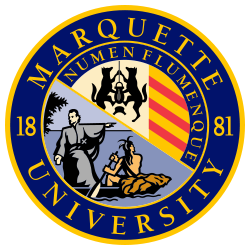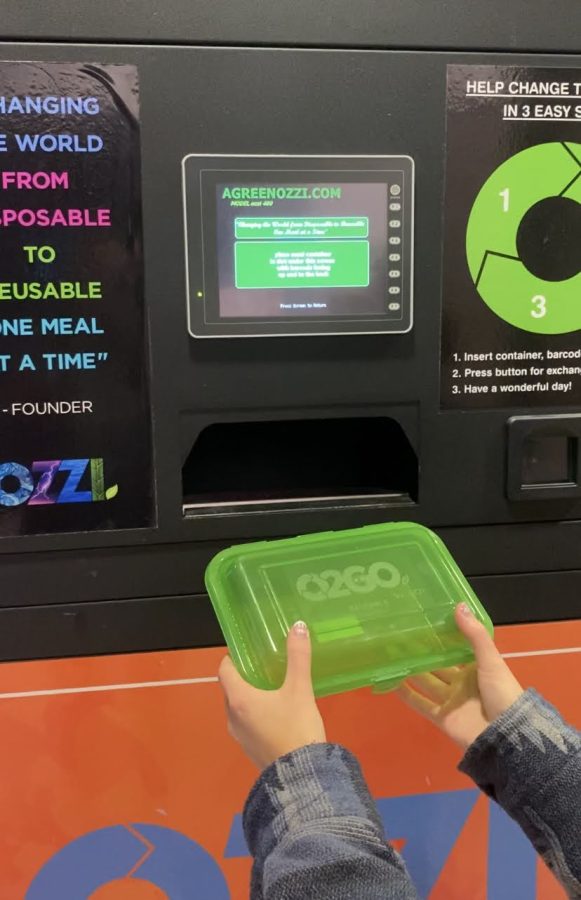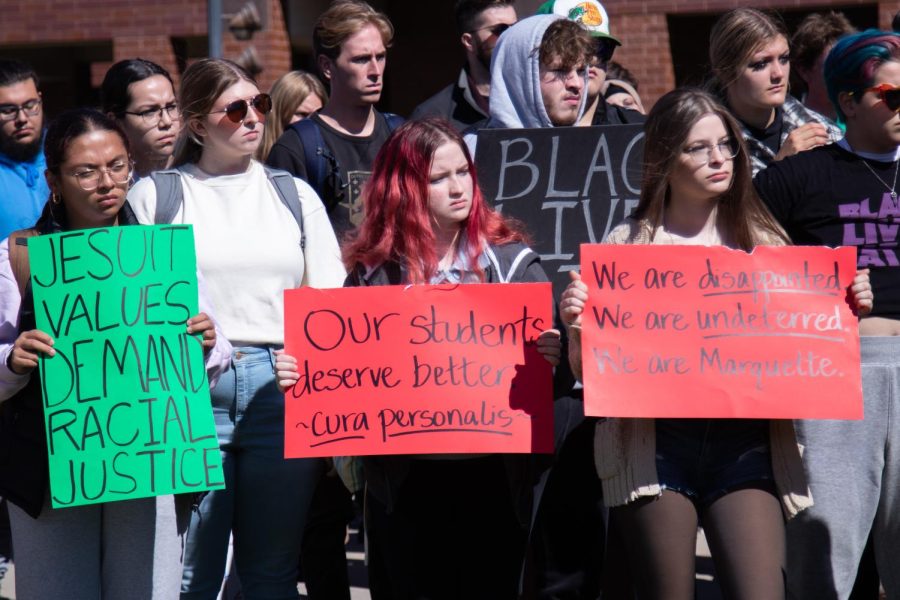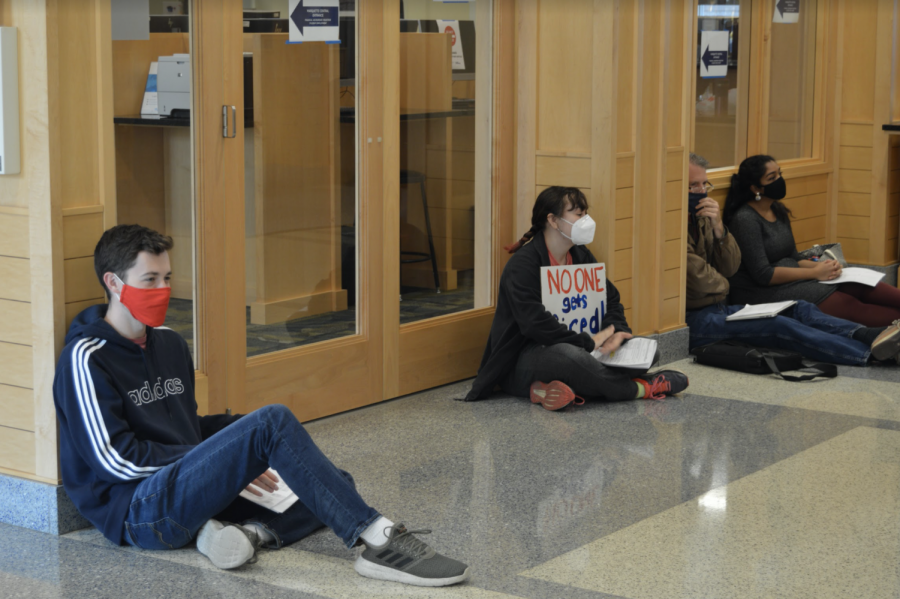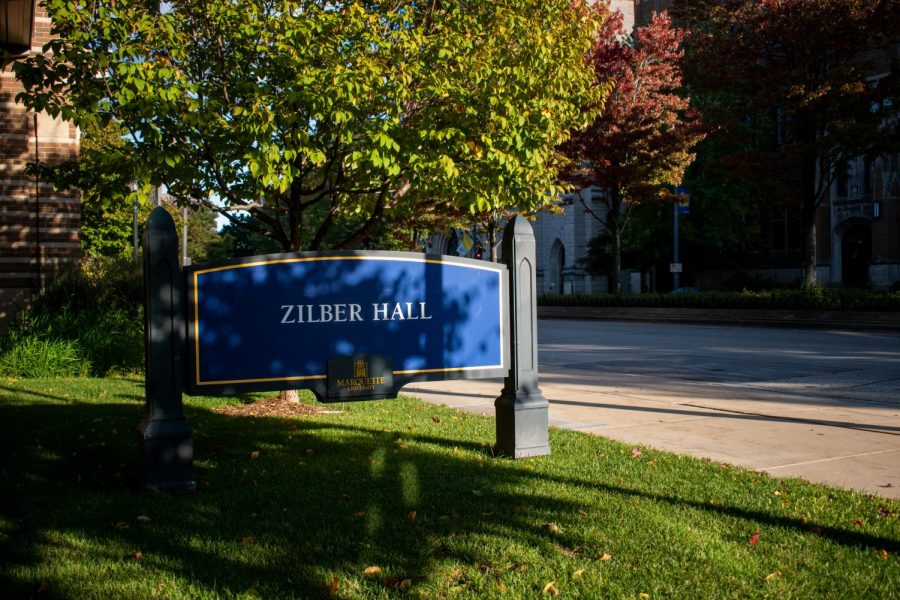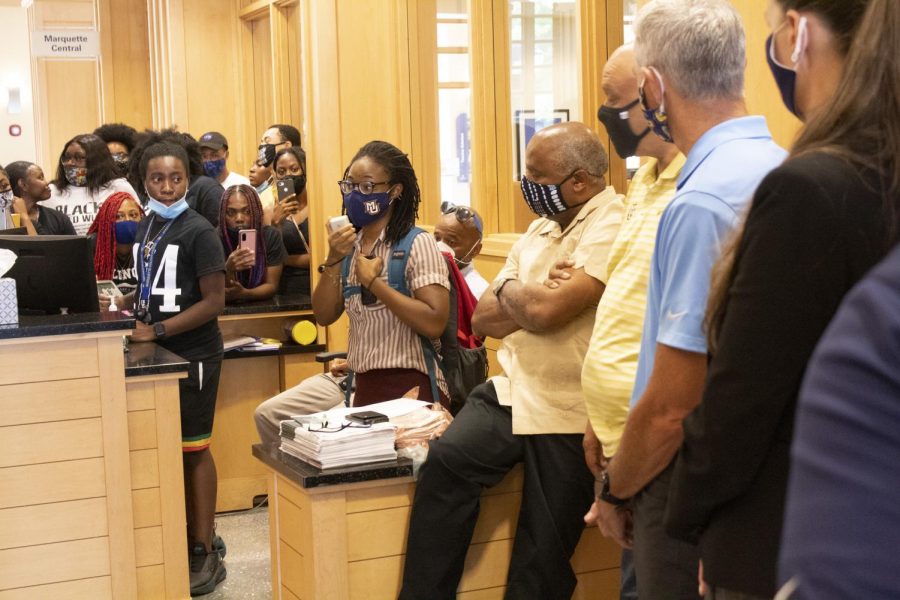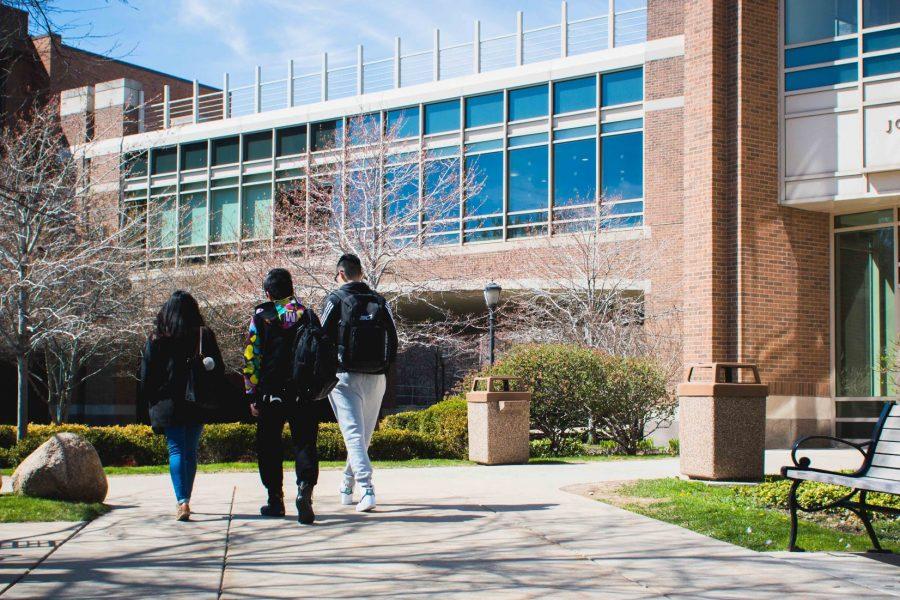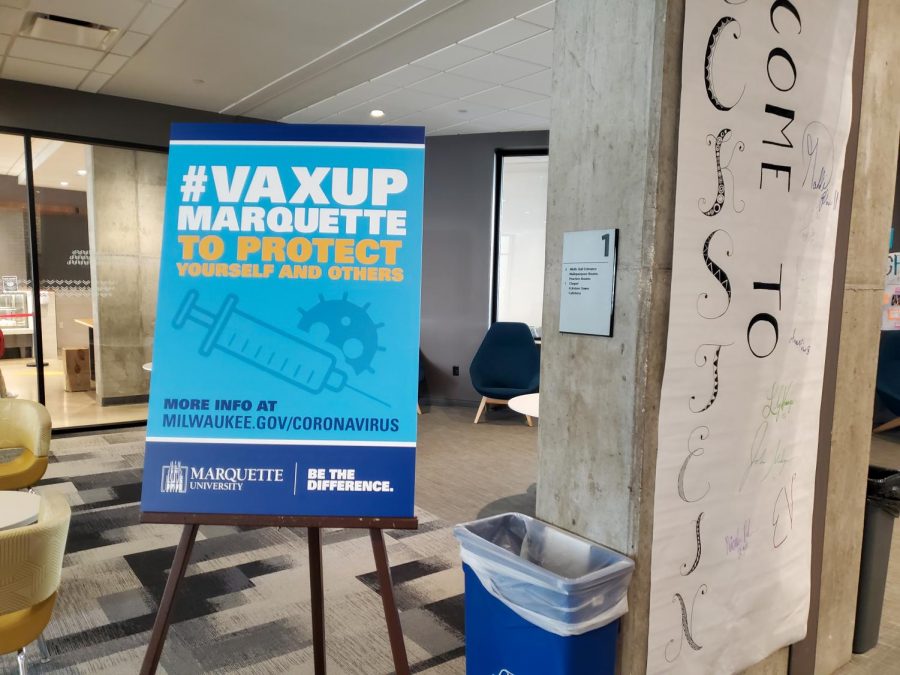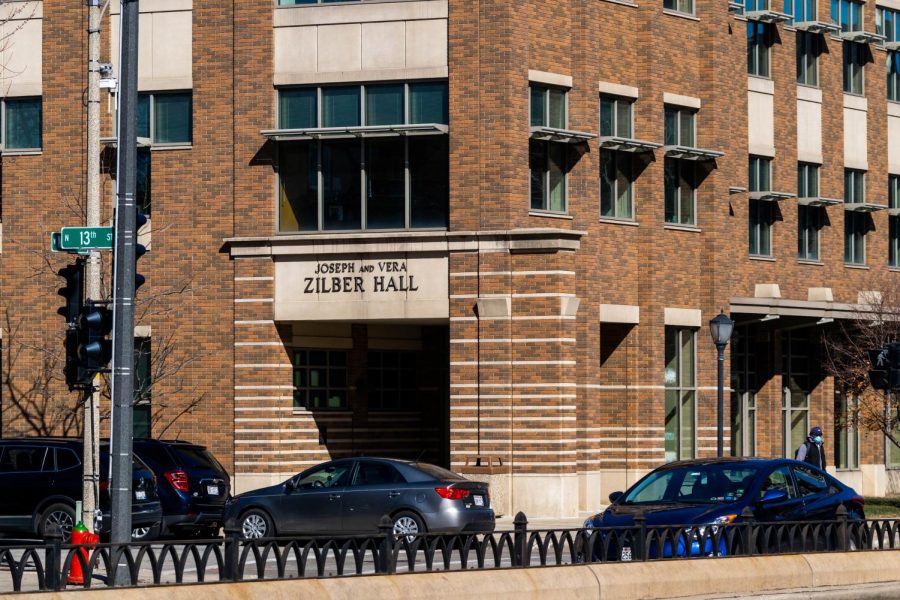Marquette University, like much of the rest of the United States, is built on stolen land.
The university must acknowledge this truth, and while it cannot take back the damage done in the past and the generational trauma experienced by Indigenous communities — such as through resettlement, assimilation and genocide — Marquette must take the necessary steps to ensure it does not continue to uphold unjust symbols and practices.
It must make deliberate efforts to support Indigenous communities on campus and in the surrounding Milwaukee community by meeting all of the demands presented by the Native American Student Association Oct. 12.
NASA led a march on Indigenous Peoples’ Day from the Alumni Memorial Union to Zilber Hall, where the organization held a demonstration and presented a list of demands to the administration. John Su, vice provost for academic affairs, was present at the demonstration, but President Michael Lovell and Provost Kimo Ah Yun were not.
The opening speech on the list of the demands said, “Whenever it comes to issues of diversity, inclusion, and support here at Marquette, our Indigenous student community is always an afterthought. Our concerns, our needs, and our issues are always marginalized, and our broader existence at this university and throughout the broader United States has and continues to be erased.”
On the list of demands, NASA and allied students, faculty and staff called upon the university to change the Marquette seal, increase indigenous student recruitment and retention, establish relationships with the Wisconsin tribal nations, develop Indigenous curriculum and foster a campus climate that is conducive to Indigenous student success and retention.
Marquette’s current seal has two parts within a blue circular band. The upper part depicts the coat of arms of the Loyola family, the motto Numen Flumenque — which means “God and the (Mississippi) River” — gold and red diagonal bands and wolves both symbolizing the House of Loyola. The lower half of the seal depicts Father Marquette interacting with an Indigenous individual who represents the many tribes and guides who accompanied him on his journey of the western Great Lakes and the Mississippi River system.
This portion of the seal is from the original 1867 painting by Wilhelm Lamprecht, which showcases Father Marquette interacting with a group of Indigenous people. However, the painting is cropped on the seal to only show one of the several Indigenous people, who is sitting below and facing away from Father Marquette.
This is problematic and unjust.
Cropping the seal this way makes the Indigenous individual appear subservient and passive. Moreover, it blatantly misrepresents the interactions between Father Marquette and the Indigenous people who he interacted with, as it makes it appear that he is the one leading the Indigenous people when in actuality, they guided him on his journey.
According to Marquette’s own webpage about the logo and seal, the Lamprecht painting “… depicts a member of the Illini, or Illinois Confederacy, offering guidance to Father Marquette and two Miami guides, who led him from the Wisconsin River to the Mississippi River … (as well as a) … vision of reciprocity and dialogue among members of the Illini and Miami tribes and Father Marquette.”
While Lamprecht’s painting attempts to showcase a more equitable relationship between Father Marquette and the Indigenous tribes he came in contact — and makes the clarification that he was the one being led, not the one leading — the university cannot be commended for its misrepresentation of these interactions on the seal.
Marquette community members not part of NASA have also expressed concern about the university seal.
Amanda Harris, a senior in the College of Arts & Sciences, started a petition over the summer calling upon the university to change the seal.
It currently has over 6oo signatures.
The university needs to be the difference. It cannot call upon students to embody this motto during and after their time at Marquette while continuing to uphold the seal.
Marquette must take the first step in addressing the misrepresentation and erasure of Indigenous communities, as this is not the first time the university has been asked to do so.
Marquette faculty and students expressed frustration and concern about the seal in 2014, 2015, 2019 and 2020.
Changing the seal would be the first step in acknowledging and righting an injustice the university is upholding. The university cannot keep putting this off.
In the list of demands, NASA presented guidelines for how the university should change the seal. NASA called upon the university to the include Indigenous names of the original tribes — Menominee, Potawatomi and Ho-Chunk — who inhabited the greater Milwaukee area. The student organization also said the university must make a contract with a local Indigenous artist from the greater Milwaukee area, incorporate Indigenous design elements specific to Milwaukee, such as the three rivers, wild rice and birchbark canoe, and remove Father Marquette and any elements of the Lamprecht painting.
NASA also said the university will “… publish and promote a narrative surrounding the redesign of the seal, why the old one was problematic, and how the new seal better represents Indigenous identities.”
The university seal is supposed to be a representation of Marquette and the ideals and values that we all stand for.
Continuing to support this seal does not uphold the value of “foster(ing) greater equity and social justice on our campus and in our world,” as stated in the university’s vision statement for institutional diversity and inclusion.
But changing the seal is not enough. The university must continue to right its wrong.
NASA’s list of demands calls for the university to provide full tuition scholarships for a minimum of 30 Indigenous students from both the Milwaukee Public School system and the Wisconsin Tribal Nations, spread over the next 3 to 5 years. Additionally, the organization said the university must hold education programming and events relating to Indigenous cultures throughout every academic year. NASA suggested hosting these events on Indigenous Peoples’ Day in October and Native American Heritage Month in November.
NASA also said the university must hire staff specifically dedicated to Indigenous student retention and success who will also Jacqueline Schram, who is the specialist assistant of Native American affairs.
For the 2018, 2019 and 2020 fall semesters, there have been only 16 Indigenous undergraduate students at Marquette, and for the fall 2018 and 2019 semesters, there have only been 5 Indigenous faculty or staff members, according to the Office of Institutional Research and Analysis. There was no data for the number of Indigenous faculty and staff members for the fall 2020 semester.
This is unacceptable.
The university must be committed to improving Indigenous’ students success and providing them with the necessary resources to do so. Additionally, hiring more Indigenous faculty and staff as well as a staff member dedicated to Indigenous student retention and success is essential, as they will be able to provide specialized support and may be more likely to share lived experience.
NASA also said the university must establish relationships with Wisconsin Tribal Nations through adopting a Land-Acknowledgment statement for all future programming and events, hiring a staff member dedicated to building relationships with the Wisconsin Tribal Nations, formalizing a relationship with the Indian Community School in Franklin, Wisconsin and continuing to work with and attend Council on Native American Affairs meetings.
Building an equitable relationship with the surrounding Indigenous communities is necessary to ensuring the university is taking necessary steps to be inclusive and listen.
Additionally, the list of demands said the university must responsibly and intentionally developing Indigenous curriculum by hiring faculty to promote the American Indian and Indigenous Studies area of the “Race, Ethnic, and Indigenous Studies” program and making an effort to retain faculty and a staff who provide essential support for Indigenous students.
The university must meet all of these demands in order to adequately support Indigenous students at Marquette and Indigenous communities in the Milwaukee area.
Marquette cannot change what the U.S. has done to Indigenous communities in the past, but it has a responsibility to right its wrongs — such as changing the seal — and ensuring that future actions support, prioritize and respect Indigenous students and communities.
This story was written by Alexandra Garner. She can be reached at [email protected]

